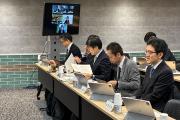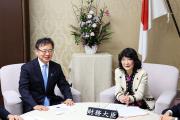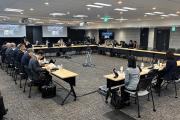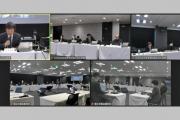After a powerful earthquake rattled the Sea of Japan coast on New Year’s Day, pharmaceutical wholesalers are scrambling to restore their damaged sites and ensure stable drug distribution to the affected region. But as of the afternoon of January 4, they were facing difficulties in accessing the northern part of the Noto Peninsula, the epicenter of the temblor.
Finese, an affiliate of Vital KSK Holdings headquartered in Kanazawa, Ishikawa Prefecture, set up a disaster taskforce on January 2 to recover its damaged sites and has put in place a regime to begin product shipments to the Noto region from January 4.
The company said, however, that transportation to the cities of Wajima and Suzu - located in Oku-Noto, or the northern part of the prefecture’s Noto Peninsula - is difficult due to severed roads. Bumps in the road have caused vehicle tires to go flat even in less affected areas, it said. The wholesaler is considering deploying special disaster response vehicles to reach the hardest-hit region.
With doctors at evacuation centers citing a particular request for flu testing kits and fever medicines, the company is poised to work towards meeting this need in cooperation with drug makers, it said.
By January 4, all Big Four wholesalers had announced that their business continuity is secured even in the disaster areas, though some had faced power and water outages at one point. Suzuken and Medipal Holdings told Jiho that while they have started shipments, access by land to the Oku-Noto region is still difficult. Toho Holdings and Alfresa Holdings’ Ishikawa-based group firm have started this year’s operations as well. The Big Four wholesalers are also providing relief supplies and other support for customers and employees as well as for evacuation shelters.
On January 4, the Ministry of Health, Labor and Welfare (MHLW) held an emergency response meeting with relevant organizations to deal with the aftermath of the quake. Speaking to Jiho after the meeting, Hiromi Miyata, chairman of the Federation of Japan Pharmaceutical Wholesalers Association (JPWA), stressed that wholesalers will collaborate with regulatory authorities and the Self-Defense Forces to strive for the stable supply of medicines to Oku-Noto and other affected districts. “Wholesalers have always been committed to delivering drugs even after disasters, as seen in the case of the Kumamoto Earthquake,” he said.
Potential Production Delay at 2 Drug Makers: FPMAJ
Meanwhile, Yasushi Okada, chairman of the Federation of Pharmaceutical Manufacturers’ Associations of Japan (FPMAJ), told Jiho also after the meeting that the trade group received reports that the latest quake could potentially result in a manufacturing delay of around one week at factories of two member companies located in the neighboring prefecture of Toyama.
“So far, two companies have reported that there might be an impact,” Mr Okada said, withholding their names. One is a factory for in-house products, while the other mainly handles contract manufacturing. These companies are bracing for a minor impact of around one week, he added.
More than 10 drug makers have manufacturing plants in Ishikawa and Toyama. Santen Pharmaceutical and Tatsumi Kagaku, among others, have their sites in Ishiwaka, but there has been no impact reported for factories in the prefecture, according to Mr Okada.











